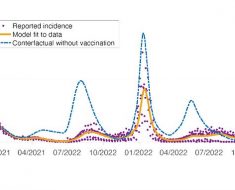Bowel cancer is a general term for cancer that begins in the large bowel and depending on where the cancer starts, bowel cancer is sometimes called colon or rectal cancer.
It is one of the most common types of cancer diagnosed in the UK and is most prevalent in people over the age of 60.
Treatment for bowel cancer will depend on which part of your bowel is affected and how far the cancer has spread, and, if detected early enough, treatment can cure bowel bowel completely so it is imperative to know the warning signs.
READ MORE
-
 George Alagiah health: BBC journalist opens up about his cancer
George Alagiah health: BBC journalist opens up about his cancer
In the initial stages of the disease, however, many people with bowel cancer do not experience any symptoms, according to Mayo Clinic.
“When symptoms appear, they’ll likely vary, depending on the cancer’s size and location in your large intestine,” noted the health site.
The symptoms of bowel can be subtle and do not necessarily make you feel ill so it is easy to overlook them for a less serious condition.
One key warning sign is the feeling that your bowel doesn’t empty properly after you’ve been to the toilet.

This often creates the feeling of needing to strain your back passage, even after opening your bowels, explains Cancer Research UK.
Other common symptoms include:
- Bleeding from the back passage (rectum) or blood in your stools
- A change in your normal bowel habit, such as looser stools, going more often or constipation
- A lump that your doctor can feel in your back passage or tummy (abdomen), more commonly on the right side
- Losing weight
- Pain in your abdomen or back passage
- Tiredness and breathlessness caused by a lower than normal level of red blood cells (anaemia)
According to the NHS, you should see your GP if you have one or more of the symptoms of bowel cancer, and they persist for more than four weeks.
What your GP will do next
When you first see your GP, they’ll ask about your symptoms and whether you have a family history of bowel cancer, explains the NHS.
DON’T MISS
Vitamin B12 deficiency: Three foods to eat on Christmas day to keep symptoms at bay [TIPS]
Carol Voderman health: The deadly condition which left the star ‘six hours from death’ [INSIGHT]
How to live longer: Adding this drink to your diet could increase your life expectancy [TIPS]
They’ll usually carry out a simple examination of your bottom, known as a digital rectal examination (DRE), and examine your tummy (abdomen).
This is a useful way of checking whether there are any lumps in your tummy or bottom (rectum).
“The tests can be uncomfortable, and many people find an examination of their bottom a bit embarrassing, but they take less than a minute,” explained the health body.
Your GP may also check your blood to see if you have iron deficiency anaemia – although most people with bowel cancer do not have symptoms of anaemia, they may lack iron as a result of bleeding from the cancer, notes the health site.

READ MORE
-
 Stomach cancer symptoms: The colour in your stools to watch out for
Stomach cancer symptoms: The colour in your stools to watch out for
Who is at risk?
Bowel cancer risk is determined by a range of factors, including age, genetics and lifestyle factors.
Obesity, for example, has been linked to bowel cancer in an estimated 11 out of 100 cases, reports Cancer Research.
Supporting the link, evidence suggests that maintaining a healthy weight by keeping active has been shown to reduce your risk.
One comprehensive study combined and analysed several decades worth of data from past studies on how exercise affects colon cancer risk.

The study, published in the British Journal of Cancer, found that people who exercised the most were 24 percent less likely to develop the disease than those who exercised the least.
“What’s really compelling is that we see the association between exercise and lower colon cancer risk regardless of how physical activity was measured in the studies,” said lead study author Kathleen Y. Wolin, Sc.D., a cancer prevention and control expert with the Siteman Cancer Center at Barnes-Jewish Hospital and Washington University.
She added: “That indicates that this is a robust association and gives all the more evidence that physical activity is truly protective against colon cancer.”
It is also important to compliment a physically active lifestyle with a healthy, balanced diet to reduce your risk.
As the NHS reports, a large body of evidence suggests a diet high in red and processed meat can increase your risk of developing bowel cancer.
Source: Read Full Article





